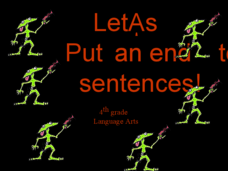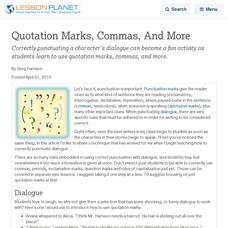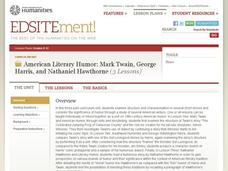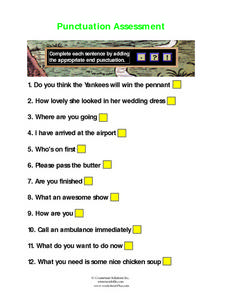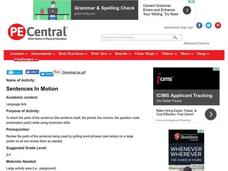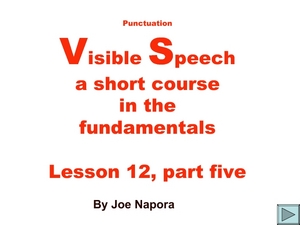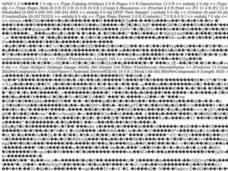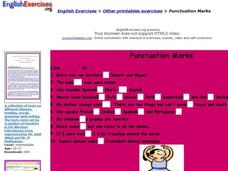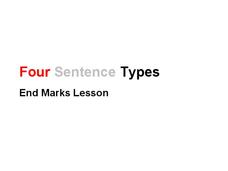Curated OER
Question Marks
Context clues are important when understanding the intent of a sentence. Kindergartners read eight sentences, and decide if each should end in a period or in a question mark. The last two questions prompt kids to draw a mouse and a cat,...
Curated OER
Questions
Explore end punctuation with this multi-step worksheet on question marks. Scholars begin by finishing 10 sentences with either a period or a question mark. Consider discussing patterns they see at this point (first word, inflection,...
Curated OER
Let's Put an End to Sentences!
Freshen up your fourth graders' memories with this 24-slide PowerPoint on punctuation marks. A brief review of the period, question mark, and exclamation mark is presented prior to the interactive quiz. Students must choose the proper...
Student Achievement Partners
"The Glorious Whitewasher" from The Adventures of Tom Sawyer by Mark Twain with Mini-Assessment
It's the classic scene: Tom Sawyer is whitewashing a fence. Expose your learners to Mark Twain's humor while reinforcing reading comprehension. Eighth graders are encouraged to read and reread, achieving as much exposure to the text as...
Curated OER
Quotation Marks, Commas, And More
Correctly punctuating a character's dialogue can become a fun activity as students learn to use quotation marks, commas, and more.
Study Champs
Punctuation
Practice punctuation with a quick exercise. Class members fill in either a period or a question mark at the end of each of 14 sentences. A brief explanation of when to use a period versus a question mark is included.
National Endowment for the Humanities
American Literary Humor: Mark Twain, George Harris, and Nathaniel Hawthorne
Nathaniel Hawthorne as a humorist? Really? The three lessons in this series focus on the the storytelling style, conventions, and literary techniques employed by Hawthorne, George Washington Harris, and Mark Twain.
Curated OER
Punctuation Assessment
In this punctuation worksheet, 3rd graders provide the end punctuation mark for twelve sentences. Punctuation marks include a period, a question mark, and an exclamation point.
Curated OER
Sentences In Motion
Explore the elements needed to make up a sentence (the sentence itself, the period, the comma, the question mark, and the exclamation point), with this language arts lesson plan. A loco-motor activity is embedded in the teaching of the...
Curated OER
Periods, Question Marks, and Exclamation Points
Students receive instruction to punctuation marks in the appropriate places using provided examples. They then place the correct punctuation in the sentences on the worksheet noting that there are some punctuation marks in the...
Curated OER
Speech Marks
The question marks, periods, commas, and quotation marks are missing. It's up to your class to fix each of six statements by adding proper punctuation. Early finishers are encouraged to compose properly punctuated sentences of their own.
Curated OER
Punctuation and Periods
Children review and study the importance of remembering to put a period at the end of each sentence. They write two original sentences that end with a period, and share them with the class. A good, confidence-building activity!
Novelinks
Maniac Magee: Discussion Questions
Why did they say that? What did they mean? How did they feel? Using the six levels of Bloom's Taxonomy, challenge your young readers to answer the comprehension questions about chapters 41 and 42 of Maniac Magee by Jerry Spinelli. Each...
Curated OER
Periods, Question Marks, Exclamation Points, and Quotation Marks
In this grammar worksheet, students supply all necessary punctuation marks in fifteen sentences. Students place a C in the space provided if the sentence is correct.
Curated OER
Punctuation
Reinforce punctuation skills with this presentation. Learners view a series of sentences and discuss the correct punctuation that is needed. The resource focuses on quotation marks, exclamation marks, periods, question marks, and...
Curated OER
Punctuation
Your never to young to know where to put commas, periods, or question marks. Little learners practice their punctuation by completing a developmentally appropriate worksheet, perfect for developing readers. They'll punctuate 10 sentences...
Curated OER
Questions And Statements
In this questions and statements activity, students review the differences between the two and put the correct end punctuation on ten sentences. Students, in addition, unscramble three groups of words to form a question and a statement.
Curated OER
Punctuation: Visible Speech
Examine the proper uses of punctuation with this easy PowerPoint. Simple, bold, and straightforward, each slide introduces a different symbol. Difficult or confusing instances are indicated as well.
Curated OER
Punctuation
Students practice using periods, question marks, and exclamation points correctly. In this punctuation lesson, students review punctuation rules and practice. Students practice together then work independently.
Curated OER
Punctuation
Here is an interesting punctuation activity! Your young learners cut out five periods and five question marks. Then, they paste them onto 10 sentences that need end punctuation marks. A good, hands-on lesson for young readers!
Curated OER
Proofreading
Do your second graders like riddles? Give them a giggle and a lesson about proofreading at the same time. After reading two riddles, young writers fix punctuation and capitalization errors. They write the answer to each riddle at the...
Curated OER
English Exercises: Punctuation Marks
In this punctuation mark interactive worksheet, students in the proper punctuation in each of 10 sentences. They insert commas, periods, question marks, semi-colons, colons, or apostrophes as needed in the sentences. They submit their...
Curated OER
Four Sentence Types: End Marks Lesson
Give sentence type instruction a boost with this informative powerpoint presentation! Learn about the four types of sentences; imperative, exclamatory, interrogative, and declarative, then check for understanding with a 10-question pop...
Curated OER
Conventions: Quotation Marks
Fifth graders determine the difference between indirect and direct quotations. For this grammar lesson, 5th graders recognize that direct quotations have quotation marks and understand what the rules are for using quotation marks.




